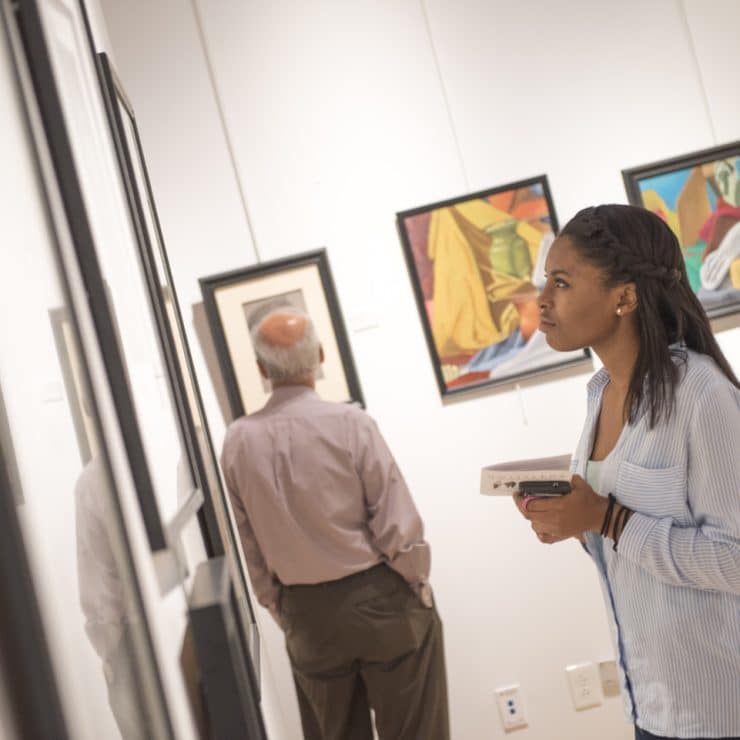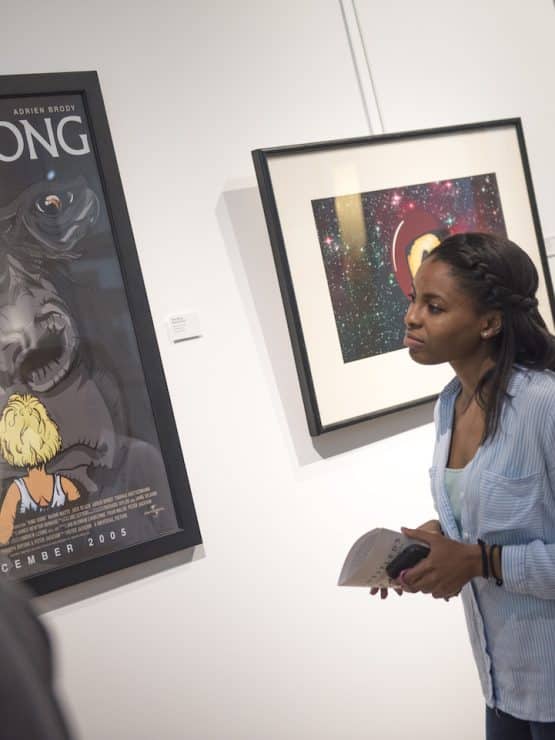
Art Education
Do you enjoy the arts, culture, and expressing yourself though visual mediums? Methodist University’s Art Education program may be for you. Through a rigorous series of foundational, historical, and studio art classes, we will prepare you for a career in Art Education. We will also give you an opportunity to earn professional licensure requirements during your education at MU.
Program Status
Effective Fall 2024, the B.A. program in Art Education is in teach out and no longer accepting new students.
Common Career Paths
Some of the top jobs for those with an Art Education bachelor degrees include art teacher, art historian, art professor, art auctioneer, art dealer, museum curator, poet, museum exhibit designer, and more.
Common Salary Ranges for Graduates
As mentioned above, there’s a long list of career opportunities for those with Art Education degrees. But, the U.S. Bureau of Labor Statistics reports the average annual salary for the following positions (which may require additional education) in North Carolina in 2021:
- Archivist, curator, and museum technician: $58,830
- Museum technician and conservator: $52,030
- Exhibit designer: $62,960
- Art, drama, and music teacher: $86,240
Average Tuition Cost
The average cost for an incoming residential freshman to attend MU is less than $18,000 – similar to the cost of attending one of the big-box public schools, but with the enhanced value of a highly-regarded private school with a 12:1 student-to-faculty ratio.
While tuition varies, depending on a student’s financial aid package, it’s important to know that the average financial award for an incoming residential freshman at MU is more than $34,000.
Financial Aid & Scholarships
More than 97% of MU students receive some form of financial aid, with the University offering more than $24 million annually to students for scholarships. If a student is active military, family of active military, or a veteran, they may also qualify for MU’s military education benefits.
Interested in Methodist University’s Art Education program?
If you have questions, reach out to Vilas Tonape using the contact info at the bottom of the page. If you’re ready to apply today, click the button below!
Frequently Asked Question
Do you enjoy the arts, culture, and expressing yourself though visual mediums? Methodist University’s Art Education program may be for you. Through a rigorous series of foundational, historical, and studio art classes, we will prepare you for a career in Art Education. We will also give you an opportunity to earn professional licensure requirements during your education at MU.
Major Requirements
The major in Art with Teacher Licensure (P-12) consists of 60 credits and is distributed as follows:
Content Course Requirements
12 credits
| ART 1010 Foundations I Design (3) | ART 2030 Foundations IV Drawing I (3) |
| ART 1020 Foundations II Design (3) | ART 2050 Foundations I Painting (3) |
Art History Elective(s)
Select 3 credits from the following list:
| ARH 3530 Renaissance and Baroque: Art History and Theory (3) | ART 3620 Theory and Practice in Art Education (3) |
| ARH 3540 Nineteenth and Twentieth Century: Art History and Theory | ART 4010 Business and Marketing in Art (2) |
| ARH 4850 Special Topics in Art History (3) | ART 4020 B.A. Senior Exhibit (1) |
Elective
Select one course (3 credits) from the following list:
| AGD 2030 Foundations III 3-D Design (3) | ART 3010 Photographic Media I (3) |
| ART 2070 Figurative Sculpture I (3) | ART 3090 Relief Printmaking (3) or ART 3100 Printmaking (Etching) (3) |
| ART 2150 Clay Sculpture (3) | ARH 2530 Survey of Art History (3) |
| ART 3000 Intermediate Drawing II (3) |
Studio Requirement
A minimum of 12 credits in one studio concentration
Foreign Language Requirement
6 credits
Teacher Professional Licensure
37 credits
Students must earn a final grade of C or better in all courses with an EDU or SPE prefix.
| EDU 1420 Field Experience I (1) | EDU 4070 Professional Orientation (2) |
| EDU 2000 Human Growth & Development (3) | EDU 4180 Teaching Methods in Secondary Music (2) |
| EDU 2400 Instructional Technology (2) | EDU 4190 Seminar in Positive Behavior Development (3) |
| EDU 2420 Field Experience II (1) | EDU 4200 Reading & Writing in the Content Areas (6-8, 9-12) (3) |
| EDU 2510 Foundations of Education (3) | *EDU 4210 Student Teaching (10) |
| EDU 3300 Educational Psychology (3) | SPE 2550 Educating Diverse Populations (3) |
| EDU 3420 Field Experience III (1) |
Licensure Testing Requirements
0 credits
| ETS Praxis I Core Academic Skills Test for Educators or requisite ACT/SAT passing scores (test codes: 5713, 5723, 5733, or combined test code: 5752) | ETS Performance Assessment (PPAT) |
| Praxis II, Art (test code: 5135) |
*A final grade of B or better is required in this course to apply for a North Carolina Teacher License.
NC State Board of Education Complaint Process
The North Carolina State Board of Education (SBE) has jurisdiction to investigate allegations of noncompliance regarding specific laws and rules. Complaints may address Educator Preparation Program requirements set forth in Article 15(D) of Chapter 115C. The SBE does not have jurisdiction over complaints related to contractual arrangements with an EPP, commercial issues, obtaining a higher grade or credit for training, or seeking reinstatement to an EPP. All complaints filed with the SBE must be in writing. A person or entity may file a written complaint with SBE by filling out a complaint form and submitting online and/or mailing or faxing a hard copy to the address on the form.
Contact
Patricia Fecher, Ed.D.

